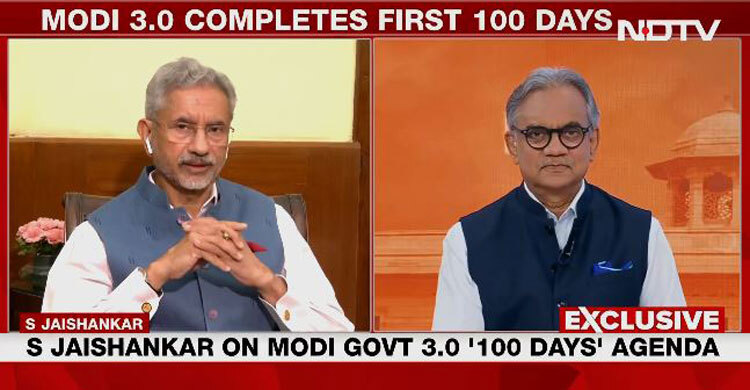Political churn in Bangladesh its internal matter: Jaishankar

India's External Affairs Minister, S Jaishankar, emphasised the importance of maintaining stable relations with Bangladesh, despite the political turbulence in the neighbouring country, calling it an "internal matter."
In an interview with NDTV, Jaishankar highlighted the interdependence of neighbouring nations, stating, "What happens is their internal matter. Bangladesh is our neighbour, and we want to keep the relationship stable. We have good trade relations, strong people-to-people ties... and we want to keep it that way."
Jaishankar's comments come amidst a political crisis in Bangladesh, where civil unrest led to the resignation of then-Prime Minister Sheikh Hasina.
The unrest, driven by a student-led movement protesting government job quotas, resulted in violence and forced Hasina to flee Dhaka.
She reportedly left the city on a military aircraft and landed at an Air Force base near Ghaziabad, Uttar Pradesh.
It was initially speculated that Hasina would seek political asylum in London, but British Home Office sources indicated that their rules do not permit such an option.
Currently, Hasina is believed to be in the custody of Indian intelligence agencies. Jaishankar confirmed in Parliament that Hasina’s office had requested permission for her departure to Delhi on short notice.
He added that India was providing her time to consider her next steps, which could include political retirement.
In the meantime, Nobel laureate Dr Muhammad Yunus, who now leads an interim government in Bangladesh, expressed his intention to maintain strong relations with India, though he stressed the importance of fairness and equality in the bilateral ties.
In his first address as Chief Advisor, Yunus said, "We want the world to recognise Bangladesh as a respected democracy," adding that he had received a congratulatory phone call from Prime Minister Narendra Modi.
Yunus also issued a stern warning to Sheikh Hasina, demanding her silence to avoid compromising the relationship between the two countries while her potential extradition is considered. "If India wants to keep her until Bangladesh requests her return, the condition is that she must remain silent," Yunus stated.
As the situation evolves, Jaishankar iterated India's commitment to its neighbours, underscoring the importance of stability in regional relations during a time of political transition.

